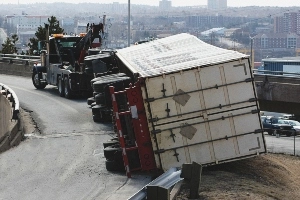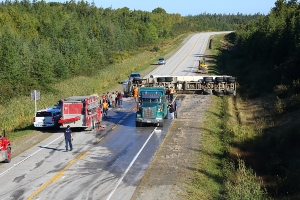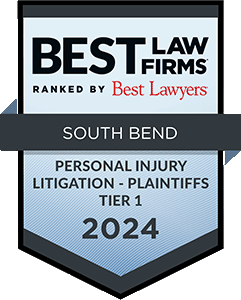
Commercial truck accidents are most likely to occur on highways and interstates, as these roads have higher speed limits and allow for heavier loads. Interstates are also how commercial trucks make their way from state to state.
Below, Pfeifer, Morgan and Stesiak discuss some of the interstates and highways in Indiana that have the most commercial truck crashes and the common crash types. Our knowledgeable attorneys also discuss factors that contribute to these accidents.
If you have been involved in a collision with a commercial truck and are unsure how to navigate through the legal process, contact our South Bend truck accident lawyers. There are no upfront costs or fees to pay.
Call our office today at (844)-678-1800 to schedule a case review.
What Highways and Roads Have the Most Truck Collisions in Indiana?
Commercial truck crashes can occur almost anywhere in South Bend. However, they are far more likely on the following roadways:
- Interstate 80
- Interstate 90
- Interstate 94
- Borman Expressway
- Local and city roads
I-90 is a major freeway that stretches more than 3,000 miles from the east coast to the west coast, and has auxiliary routes to major cities like Chicago. Both Interstate 90 and Interstate 80 see significant vehicle traffic each day. More than 25,000 vehicles traverse these roads each day in South Bend alone.
What Are the Most Common Types of Crashes Involving Trucks?
These are some of the most common commercial truck crashes that occur on interstates and other highly trafficked roads:
- Rear-end collision: There are two main types of rear-end collisions with commercial trucks. Either a driver crashes into the back of a commercial truck or a commercial truck crashes into the back of a passenger vehicle. Commercial trucks can cause significant damage when they hit the back of a passenger vehicle. Meanwhile, passenger vehicles can get pulled under the trailer, resulting in catastrophic vehicle damage and life-threatening injuries.
- Rollover crashes: This type of crash is likely to happen when a truck maneuvers at a high speed or makes a quick turn. The truck could fall onto other vehicles or become an obstacle for oncoming drivers, who may not be able to slow down or stop in time to avoid a crash.
- Jackknife incidents: This accident happens when the trailer swings out at a 90-degree angle from the cab. Jackknife incidents could happen because of braking too hard, which could cause the brakes to lock up, or slippery road conditions.
- Blind-spot accidents: Truck drivers have a lot more trouble seeing cars in adjacent lanes. This is because trucks are so large and have huge blind spots. If truck drivers are not careful, they can sideswipe vehicles in adjacent lanes, causing catastrophic damage to the vehicle. If you find yourself in a truck’s blind spot, move out of it if possible. Whenever you are sharing the road with a commercial truck, you need to make sure you can see the driver in the sideview mirror. If you cannot see them, they cannot see you.
What Causes Collisions With Truck Drivers?
Commercial truck drivers often travel through multiple states to deliver supplies or products on a very tight schedule. This is just one of many factors that help make truck crashes much more likely. There is also a shortage of truck drivers that affects hiring decisions by trucking companies. Below, we explain some of the consequences of tight deadlines and truck driver shortages, and how these consequences cause crashes:
Inexperienced Drivers
Truck drivers who lack experience may not remember the proper stopping distances or how to make a turn safely. They may not be familiar with their blind spots. Additionally, inexperienced drivers may not know how to deal with weather conditions or how to navigate through heavy traffic. Training and continuous practice can help drivers to overcome their lack of knowledge. Unfortunately, these drivers put others at risk while they get their on-the-road experience.
Driver Fatigue
As mentioned before, truck drivers usually cross through multiple states to deliver products to a destination like a grocery store or factory. These deliveries must be made on a tight schedule.
The problem is this puts pressure on drivers to stay on the road for several hours at a time. They may not have much time to sleep or take a nap. They may also struggle to get restful sleep, as they may try to get a few hours inside the truck itself. This results in fatigued driving, which can be just as dangerous as drunk driving.
The Federal Motor Carrier Safety Administration (FMCSA) imposes these rules to help with driver fatigue:
- Drivers should not drive more than 14 consecutive hours after being off duty for 10 consecutive hours.
- Drivers cannot drive for more than 11 hours after being off duty for 10 consecutive hours.
- It is mandated that drivers take a 30-minute break after working for 8 consecutive hours.
Load Issues
Overloading a truck can become hazardous on the road. Items can shift, causing a driver to lose control of the truck.
Other types of hazards that can happen due to loading issues include:
- Tires can blow out due to the extra weight
- Cargo falling into the road, causing a collision with other vehicles.
- Trucks can tip over due to weight and cause a crash with other vehicles in adjacent lanes
- Excess weight can push a truck downhill, making it harder for the driver to slow the truck down.
Weather Conditions
Snow, heavy rain and fog can make roads slippery. This means truck drivers need more space to slow down. If drivers are not paying enough attention, they may be unable to slow down or stop to prevent a collision. They could also lose control because they were unprepared for slippery or wet conditions.
These are some of the other risks of inclement weather for truck drivers:
- Heavy rain can cause trucks to hydroplane.
- Thick fog can impair drivers’ visibility.
- High winds can make it harder to control the truck, especially at high speed.
- Cold weather can affect tire pressure, brakes and fuel lines.
Poor Vehicle Maintenance
Truck drivers should examine their vehicles before making a trip to find any mechanical issues that could result in unexpected breakdowns, delays or accidents.
Drivers should also take the following steps to make sure their vehicles are in proper working order:
- Conducting post-trip inspections
- Following the manufacturer’s instructions for oil changes and filter replacements
- Listening to the truck for unusual noises that may indicate a problem
- Looking for leaks, loose parts, or worn components
Trucking companies also have a vital role in ensuring trucks are working properly and do not have significant safety issues that could result in a dangerous crash.
Contact Our South Bend Office To Schedule a Free Case Review
We understand that navigating through the legal process is a challenge, especially when recovering from injuries. However, you do not have to go through the process alone. Our experienced attorneys are prepared to assist you throughout the legal process.
We can speak to the insurance company on your behalf and calculate losses related to the accident so that we can pursue maximum compensation.
We do not charge any upfront cost for legal services. We only get paid if we win your case and receive compensation.
Call Pfeifer, Morgan and Stesiak today to learn more: 574-444-0741.











